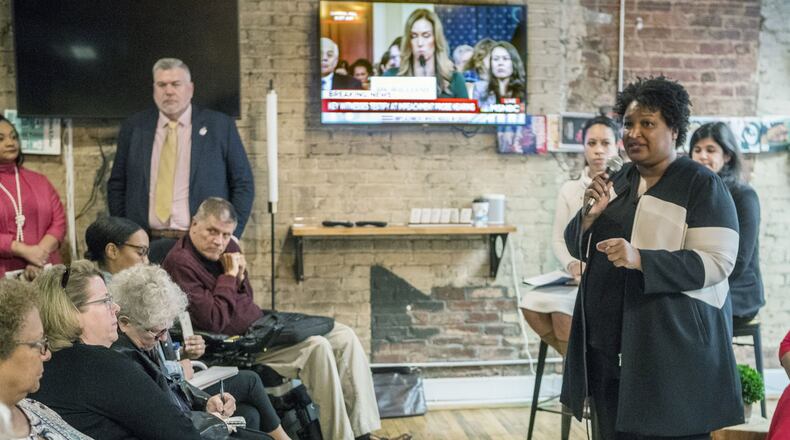Lawyers for organizations that supported Democrat Stacey Abrams’ 2018 run for governor told a judge Wednesday that accusations of campaign finance violations are little more than a “fishing expedition” to find evidence that doesn’t exist.
Fulton County Superior Court Judge Jane Barwick said she will rule soon on whether Abrams' campaign and several nonprofit organizations must produce additional documents sought by the state ethics commission, which is investigating whether they illegally coordinated efforts.
The agency asked Barwick to order Abrams' campaign to comply with a subpoena for more documents that could show whether Abrams and the groups worked together to promote her candidacy. Georgia law prohibits independent groups from coordinating with candidates.
The case arose in the wake of the contentious governor’s race between Republican Brian Kemp and Abrams. The subpoena was issued last year by the agency’s director, David Emadi.
Abrams’ campaign already gave the agency, formally known as the Georgia Government Transparency and Campaign Finance Commission, about 4,000 documents showing checks, wire transfers, bank records and campaign transactions. But the campaign and the organizations are fighting the agency’s demand for additional information that they say isn’t relevant to the investigation.
“We did not coordinate with outside groups,” Lauren Groh-Wargo, Abrams’ former campaign manager, said after the court hearing. “We responded to the subpoena and gave them everything they asked for. They have no evidence. It didn’t happen, period.”
An attorney for the ethics commission said it needs an explanation for spending by the New Georgia Project, a voter registration group founded by Abrams, and an affiliated organization, the New Georgia Project Action Fund.
Social media posts by the groups sought to hire canvassers for Abrams and pay them $15 an hour, said Christian Fuller, an assistant attorney general. Other posts showed volunteers or staffers wearing shirts supporting Abrams and seeking donations to help her.
In addition, the groups had some of the same founders and street addresses, he said.
“The commission is not on a fishing expedition,” Fuller said in court. “It’s just trying to determine who paid for what and whether it should have been disclosed.”
Fuller also pointed to mass emails from Abrams’ campaign that gave updates, talking points and advice for how to raise money.
But those emails don’t amount to direct communications that would justify an allegation of illegal campaign coordination, said Joyce Gist Lewis, an attorney for the Abrams campaign.
Since the campaign finance agency hasn’t found anything improper, it’s trying to dig into personal emails and other documents unrelated to the allegations, Lewis said.
“Maybe they really just have nothing and they’re looking for some place to hang their hat,” Lewis said. “They’re hoping to get it through this court.”
Emadi announced he would subpoena Abrams' campaign records days after the commission appointed him to lead the agency in April.
The agency sought all correspondence between the campaign and a number of groups that registered and mobilized voters, many with a focus on energizing minorities.
Emadi said at the time that he intended to present evidence that the groups’ donations exceeded contribution limits. Abrams’ attorneys have denied that claim.
Abrams’ supporters say Emadi, a former officer in the Douglas County GOP who donated $600 to Kemp’s campaign, is biased. Emadi declined to comment after Thursday’s court hearing.
About the Author
Keep Reading
The Latest
Featured




